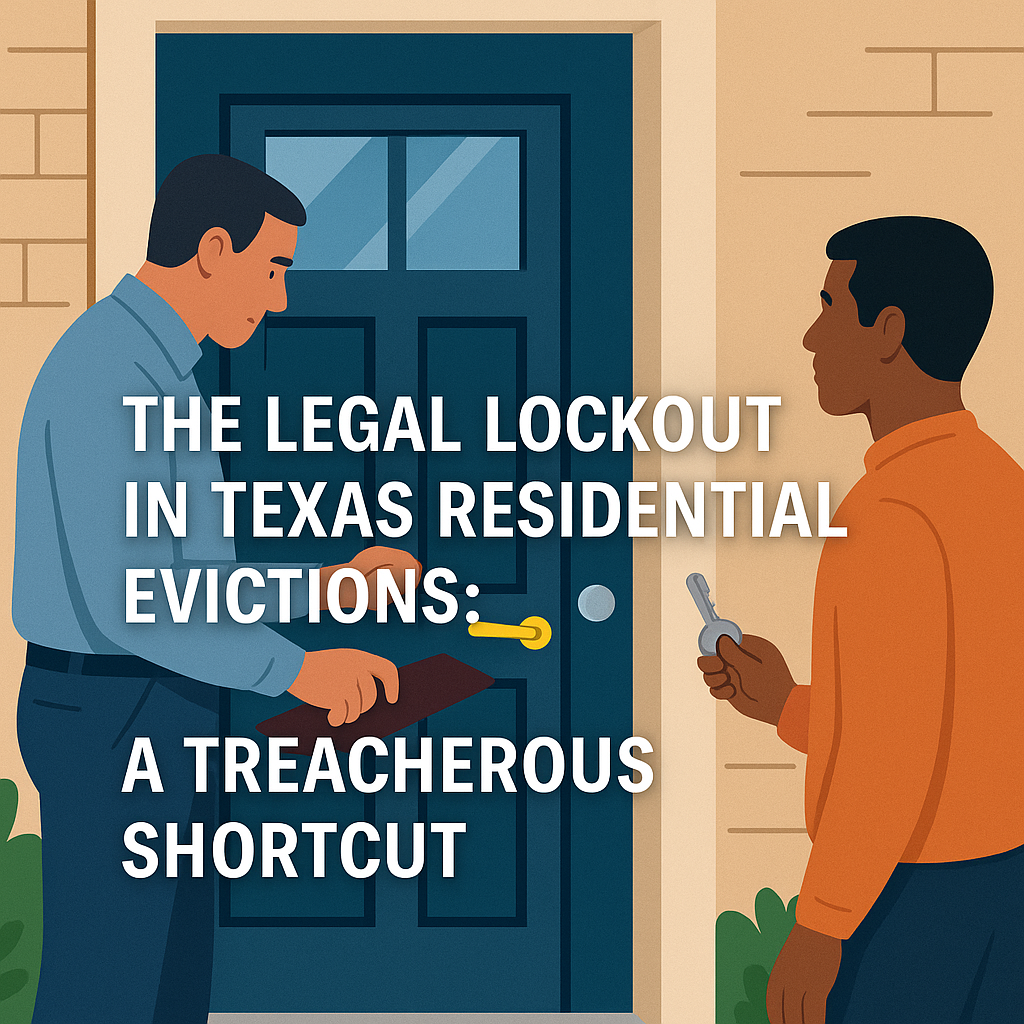
When a tenant falls behind on rent or violates the lease, some landlords are tempted to “just change the locks.” But in Texas, this path can be legally treacherous. A “lockout” might seem faster than formal eviction, but it’s strictly regulated under the Texas Property Code, and missteps can expose a landlord to serious liability.
1. What Is a Legal Lockout?
A legal lockout occurs when a landlord lawfully changes the locks on a tenant’s dwelling for nonpayment of rent under limited statutory authority. The governing law is Texas Property Code § 92.0081, which strictly controls when, how, and under what conditions a lockout can occur.
A lawful lockout is not an eviction. The landlord may deny entry temporarily, but cannot take or keep possession of the premises or the tenant’s personal property. It’s intended only as a limited leverage tool to prompt payment—not as a substitute for the court eviction process.
2. Requirements Under Texas Law
To perform a lockout legally, the landlord must:
- Provide Advance Written Notice. The landlord must give the tenant at least three days’ written notice before changing the locks. The notice must clearly state:
- The earliest date the locks will be changed;
- The amount of rent due;
- The name and address of the person to whom rent may be paid; and
- The tenant’s right to obtain a new key at any hour, regardless of whether payment has been made.
- Make a New Key Available 24/7. Even after the locks are changed, the landlord must provide a new key upon request at any hour, whether or not the tenant pays the delinquent rent. Failing to do so is an unlawful lockout.
- Limit the Lockout to Rent Defaults. Lockouts can only be used for nonpayment of rent, not for other lease violations such as noise complaints or unauthorized occupants.
3. The Risks of an Illegal Lockout
A lockout that violates § 92.0081 can result in:
- Immediate re-entry rights for the tenant;
- Statutory penalties—one month’s rent plus $1,000, actual damages, court costs, and reasonable attorney’s fees;
- Potential criminal trespass or wrongful eviction claims; and
- Court-ordered possession restoration via a writ of reentry.
For landlords, the “quick fix” of an unlawful lockout can become a costly legal nightmare. For tenants, knowing your rights can prevent wrongful exclusion from your home.
4. The Safer Alternative: Formal Eviction
Texas law provides a structured eviction process—beginning with a Notice to Vacate, followed by a forcible detainer suit in Justice Court, and then, if necessary, a writ of possession issued by the constable. This process, while slower, is far safer legally and ensures due process is followed.
A landlord who follows the proper eviction route is protected by court orders, sheriff’s enforcement, and legal finality—while one who shortcuts the process risks lawsuits, fines, and reputational harm.
5. Why Legal Lockouts Are Treacherous
Legal lockouts are rife with pitfalls because:
- Many leases are poorly drafted and don’t include the statutory lockout clause.
- The statutory notice requirements are highly technical.
- Tenants can easily allege an improper lockout, even if the landlord acted in good faith.
- Judges often view lockouts skeptically, favoring the judicial eviction route instead.
In short: while legal in narrow cases, lockouts are almost always more trouble than they’re worth.
Conclusion
The Texas Property Code allows landlords to use lockouts—but the margin for error is razor-thin. For both landlords and tenants, it’s wise to seek legal guidance before resorting to or responding to a lockout. The cost of doing it wrong can far exceed any unpaid rent.
At David C. Barsalou, Attorney at Law, PLLC, we help clients navigate business, family, tax, estate planning, and real estate matters ranging from document drafting to litigation with clarity and confidence. If you’d like guidance on your situation, schedule a consultation today. Call us at (713) 397-4678, email barsalou.law@gmail.com, or reach us through our Contact Page. We’re here to help you take the next step.